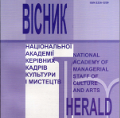«Entertainment» як мистецький феномен у контексті дискурсу Ренесансу
"Entertainment" as an art phenomenon in the context of Renaissance discourse
Author(s): Olena Petrovna ChumachenkoSubject(s): Theatre, Dance, Performing Arts, Cultural history, Architecture, Aesthetics, 15th Century, 16th Century
Published by: Національна академія керівних кадрів культури і мистецтв
Keywords: "Entertainment"; carnival; Renaissance culture; collective experience; interpretation;
Summary/Abstract: The purpose of the article consists of exploring carnival as a form of “Entertainment” in Renaissance discourse. The research methodology consists in the application of analytical method - to determine the theoretical and methodological foundations of the study of the phenomenon of "Entertainment" in the discourse of Renaissance; formalization method - to formulate the concept of "Entertainment" within the subject field of art; we use historical and cultural method for studying the phenomenon of «Entertainment» as a form of individualization of collective experience on the example of carnival in the context of the Renaissance discourse. The scientific novelty of the work is that for the first time the essence of the phenomenon of “Entertainment” as a form of individualization of collective experience on the example of carnival in the context of the Renaissance culture. Conclusions. Since the late Middle Ages, the carnival has become a prominent phenomenon in the culture of laughter, offering an antithesis to the religious attitudes that monopolized culture and art. Carnival, as a form of «Entertainment» in the discourse of the Renaissance, contributes to the identification of laughter elements in the culture of the Renaissance and helps to determine the significance of the laughter aspects of socio-cultural processes for society as a whole. The body image, as the main image of the carnival, creates a tendency for organizing "mass laughter", that is, a category that is actively used in our time on the example of the KVN format, which has become all-encompassing in modern society. Carnival, from the point of view of the cognitive perspectives of historical and anthropological research, outlines the features of the mentality of a Renaissance person. The carnival, as a form of «Entertainment», created conditions for the individualization of the collective experience, which was reflected in the culture of laughter, that is, «another reality» at certain times every year. Carnival formulated a concentrated universalistic formula for life and historical process. A street style of speech and imagery was formed, which became the «implementation» of the opposition to the official culture of the Renaissance.
Journal: Вісник Національної академії керівних кадрів культури і мистецтв
- Issue Year: 2021
- Issue No: 3
- Page Range: 129-133
- Page Count: 5
- Language: Ukrainian

